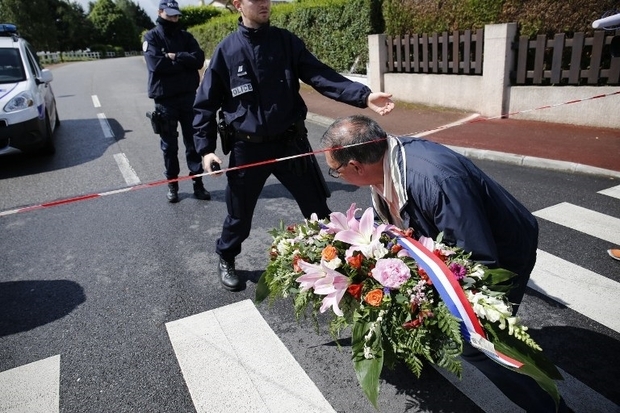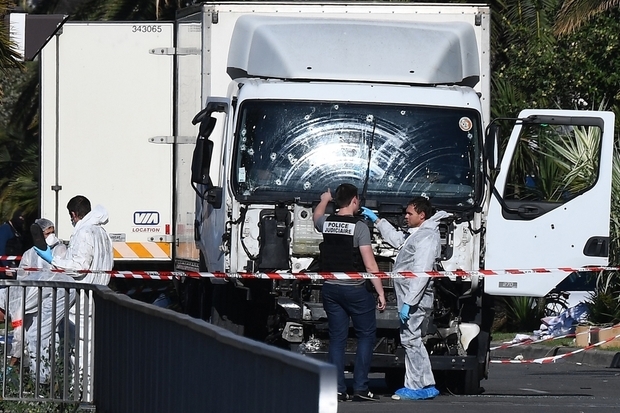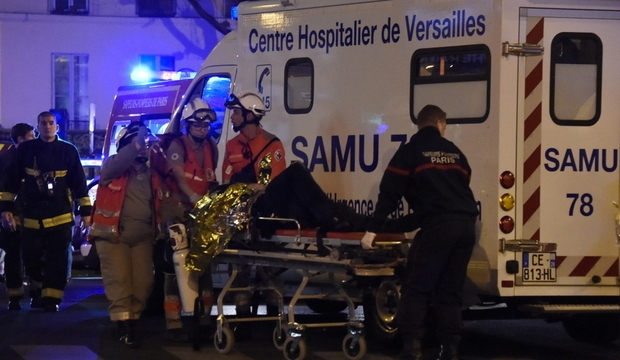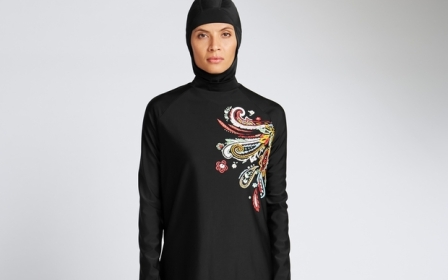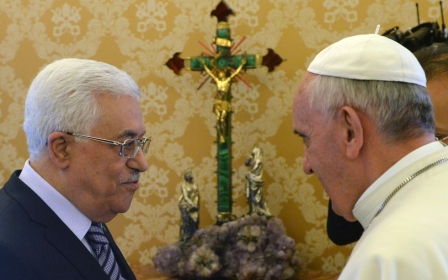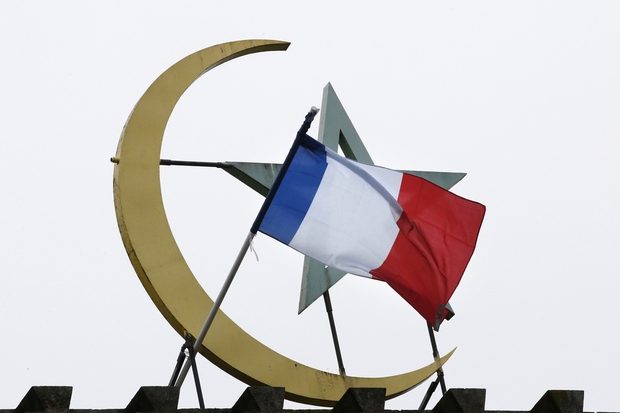
How IS has left France asking: Where do we go from here?
Does the Islamic State group see France as the sick man of Europe, the weak link that can be broken? Is it trying to provoke the destruction of French society? Is a civil war in France, with its share of armed militias and inter-communal clashes, no longer the stuff of mere dystopia or a social horror story by Ivan Riouffol, the ultra-conservative columnist of Le Figaro?
'They want us to panic. They are trying to drag us into a civil war between communities'
This type of conflict is exactly what Dabiq, the English-language publication of Islamic State (IS), predicted in February 2015. In its jihadist version of the chaos theory, the group’s narrative links all the terrorist attacks that took place in Europe, including Belgium and France, within a larger plan aimed at stirring up civil war in the West and eliminating what it calls the "grey zone”. This expression is used by IS to designate the middle ground where Muslims and those qualified as "infidels" coexist in Europe.
Through its targeted attacks, IS intends to fragment the grey zone and make any coexistence between Muslims and non-Muslims impossible. This strategy echoes George W Bush's old refrain of “with us or against us” and compels Muslims to join IS in the regions it controls.
Why France is taking the idea of 'civil war' seriously
The civil war hypothesis is, in fact, taken very seriously by French politicians and intelligence services.
Patrick Calvar, general director of the internal intelligence services (DGSI), sounded alarmist when he appeared before parliamentary members of the investigation committee reviewing the means implemented by the French state to fight terrorism. According to him, France will face “a confrontation between the ultra-right and the Muslim world,” adding: “Not the Islamists, but indeed the Muslim world.”
Marie Recalde, a Socialist Party (PS) parliamentarian, member of the National Assembly defence committee and vice-president of the investigative committee on anti terrorism, is similarly alarmed. “The attacks are aimed at destabilising the republican unity, the French society,” she told Middle East Eye.
“They want us to panic. They are trying to drag us into a civil war between communities. There is a real risk. Politicians are very worried. Security forces have been preparing themselves for urban guerrillas for a long time.”
Two men pledging allegiance to IS murdered Father Jacques Hame at a church in Saint-Étienne- du-Rouvray, Rouen, last month. Immediately the formidable loudspeaker represented by social media buzzed anew, as the hashtag #DéfendsTonEglise (“Defend your church”) rapidly ranked among the most popular of the day.
This worried Odon Vallet, an expert on religion. “Those calls to form militias and private police are extremely dangerous because there is a real risk of religious clashes as well as clashes of civilisations,” the historian told MEE. “Some Catholics are tempted by anti-radicalisation radicalisation, as a response to Islamic radicalisation. For now, this would translate into votes in favour of far-right candidates. But I am pessimistic if the attacks continue.
“I would never have used the term ‘war of religions’ six months ago, even after [the IS attacks in Paris on] 13 November 2015. But after the attack in Nice [on 14 July], and the attack against the church, we can speak about it. There could be even more xenophobia, and therefore Islamophobia.”
This fear is shared by the political analyst and Islamic specialist Islam Rachid Benzine. According to him, French Muslims are targeted “on three levels".
“First, by Daesh [IS], which disfigures their religion. They can also be affected by the anti-Muslim backlash. Lastly, they are hit in the flesh; in Nice one third of the victims were Muslims,” he told MEE.
However, Benzine rejected the idea of a “war of religions,” highlighting the moderate position adopted by the Church of France after the murder of Hame, as well as the fact that interfaith dialogue is “very important in the country.
“In the mosques, people prayed so that this priest could rest in peace,” he emphasised.
How IS appeals to the excluded in French society
In the aftermath of the attacks against Charlie Hebdo and the Hyper Cacher supermarket in January 2015, French President Francois Hollande emphasised that France was targeted because of its “lifestyle” and because it is a “country of freedom”.
Yet, this declaration did not prevent a fundamental question being raised: was France attacked for what it is - or what it does?
Top of the agenda for debate was French military involvement and bombing operations in Syria and Iraq. But the Nice attack, on France’s national day, as well as the targeting of a church in rural Catholic France, raised another question: is France now attacked for what it represents?
The country has the most important Muslim and Jewish communities in Europe. Moreover, it combines a still significant past as the “oldest daughter of the Church” and a present where secularism is closely associated with the republic. All of this is compounded with a colonial past in the Arab and Muslim world.
For Odon Vallet, until the attack in Saint-Étienne-du-Rouvray, terrorists had targeted the so-called secular France, the France which opposes, for example, the wearing of the veil.
But, he said, "the symbolic dimension of the church attack is essentially anti-Christian. In a way, Francois Hollande underlined this connection by saying that the priest’s murder was ‘a desecration of the republic,’ thereby mixing religious and profane terminology.”
Other distinctive features of French society can also explain IS’s continuous, horrific pressure.
Sociologist Farhad Khosrokhavar, who closely studies the phenomenon of radicalisation, spoke about “the patent electrisation of the French society”. He explained that “in France, the question of the banlieues [suburbs], of the violent decolonisation process, of secularism, of republicanism, is important. Some migrants’ descendants have a stronger impression of having been robbed of their dignity, of being humiliated. Some people are predisposed to identify themselves with the perpetrators of the attacks. They find here a reason for imitation.
“Besides, these attacks have caused anguish in French society and the more we speak about them, the more we’ll demonise the assailants and the more they will attract these kind of people. They find in these examples what I call ‘the negative hero’ and therefore feel that they themselves can become someone, while before they felt they were nothing.”
'Some people are predisposed to identify themselves with the perpetrators of the attacks'
Meanwhile political analyst Francois Burgat questioned “the French vision of laïcité, or secularism. "France has a precision in its relationship with it [secularism], distinct from the other, quite different Anglo-Saxon version. The ethnic or confessional alterity à la Française is more divisive,” he told MEE, adding that the country has a “very ethno-centric concept of secularism”.
More broadly, Burgat pointed to what he calls a “globalisation of resentment". According to him, those who are disappointed or excluded in French society have internalised the imaginary world of the disappointed and excluded of the Middle East.
“Even if they have not been formally recruited by this organisation [IS], they appropriate its motivations,” he told MEE.
Recalde also regrets that the authorities have not paid attention to a difficult social problem, namely that some young people targeted by the jihadist propaganda have never seen their parents work.
The lawmaker noted that if the “social apartheid” denounced by French Prime Minister Manuel Valls after the January 2015 attacks constitutes “a breeding-ground for Daesh,” it does not explain everything.
“Those who left for Syria also come from integrated families. Daesh tries to instill poison into society as a whole. Its propaganda is very well adapted and changes frequently.
“But these attacks reveal that things need to be settled, especially on the issue of integration. The Muslim community is already feeling stigmatised. We have to be wary of the messages which conflate nationality and religion.”
Is France seeing the ’uberisation’ of terrorism?
Beyond the Muslim community and the endless questioning about its place in the French republic, have other unresolved social tensions been awakened by these attacks?
If, as Khosrokhavar told MEE, “Daesh now fires on all cylinders,” is the fabric of French society eminently flammable?
Take the issue of Corsican independence, which quickly became drawn into the wider debate through a communique issued by the National Liberation Front of Corsica (FLNC), a nationalist movement considered terrorist by the French authorities.
The FLNC warned the “radical Islamists in Corsica” that any attack on the island would trigger “an unwavering response, without qualms”. Moreover, the Corsican nationalists told the state that “if a tragedy happened [in Corsica … ], its responsibility would be important.”
Another possibly unresolved tension is that simmering between the Catholic church and the French state. During the homily given at the funeral of Father Jacques Hamel, the cardinal and archbishop of Paris André Vingt-Trois raised questions which stoked controversy.
The clergyman, who also presides over the bishops’ conference of France, denounced in his speech the “silence of the elites in front of the deviances of the mores and the legalisation of deviances.” This was a thinly veiled allusion to the so-called mariage pour tous (marriage for all) law, which legalised homosexual unions in 2013.
These attacks have also highlighted the fact that if Islam has often been accused of being unable - or unwilling - to adapt to the French principle of secularism, then part of the Catholic church itself does not seem able to accommodate itself that well either.
Commenting on the murder of Father Hamel, the archbishop of Rouen Dominique Lebrun, said that “putting [religions] aside does not help. I think we are at the end of the [French] model of laïcité which has been [left] exasperated these past [few] years.”
'Though our country is ready for counter-espionage, it is not ready for this form of counter terrorism'
And, as happens after each attack, there were clashes between supporters of an all-security approach and those opposed to any anti-freedom legislation.
All this has happened against the backdrop of crucial presidential elections scheduled for spring 2017. Former president Nicolas Sarkozy, for instance, declared that respect for what he called “legal quibbles” was likely to slow down the fight against terrorism.
He referred in particular to the policy of placing people registered in the so-called "S File" - which includes those suspected of "violation of the security of the state" - in detention centres.
This "Guantanamo à la Française" is not to the liking of Alain Juppe, his direct competitor for the presidential nomination of the Republicains party, who declared that he refused “to choose between the rule of law and the protection of the French people".
But for Recalde and many experts, what matters now is “reinforcing the means of the intelligence services".
“France has already the most security-oriented system it’s had for a long time,” she said. “IS's new strategy is to make the jihad where its fighters are located, and make do with what they have to hand.
“We were not prepared for that kind of ’uberisation’ of terrorism, even though the security services have been sounding the alarm for a while. Though our country is ready for counter-espionage, it is not ready for this form of counter terrorism.”
Where does France go from here?
So how can France take up the challenges raised by IS and its attacks on its soil? The explanations which reduce everything to a merely religious dimension have, very quickly, dominated the political discourse.
For example, Manuel Valls, the French prime minister, expressed the idea of building “urgently […] a real pact” with Islam by, among others, reconsidering the rules on its foreign funding.
Although Valls said that France’s second religion had “found its place in the republic,” he called on Muslims to fulfill “a duty of lucidity, faced with the rise of Islamism and globalised jihadism with its apocalyptic vision.”
'We must stop looking for the key to ’deradicalisation’ in the ‘reform of Islam''
Rachid Benzine did not seem far from sharing Manuel Valls’ analysis. In his view, Muslim French mustn’t “lock themselves into a dual discourse, saying that it is the fault of Islam and saying that it is not its fault," he told MEE.
"The struggle will consist of denouncing the perverse use of their religion. Internal criticism is more than salutary."
But doesn’t considering IS through the religious and security prisms play into the hands of the group’s rhetoric?
Indisputably for Khosrokhavar, who asserted that “by attributing the Nice attack to Daesh, the authorities have given the impression of the group’s all-power, whereas this act was committed by an individual who wanted to commit suicide and kill as many persons as possible in the process, in a narcissistic imitation.
"We must stop looking for the key to ’deradicalisation’ in the ‘reform of Islam'."
As for the political analyst Francois Burgat, he called for a return to discussing of IS only in political terms.
“We must stop looking for the key to ’deradicalisation’ in the ‘reform of Islam’,” he told MEE. While the latter analysis considers that “religious radicalisation causes political radicalisation,” Burgat argues that the reverse is true and that political radicalisation precedes religious radicalisation.
“The security and sectarian one-upmanship of a very large part of the political class is a victory for Daesh and its dividing strategy,” he added.
"it is a wrong analytic track which exempts non-Muslims from any responsibility.”
This article was originally published on Middle East Eye's French website.
New MEE newsletter: Jerusalem Dispatch
Sign up to get the latest insights and analysis on Israel-Palestine, alongside Turkey Unpacked and other MEE newsletters
Middle East Eye delivers independent and unrivalled coverage and analysis of the Middle East, North Africa and beyond. To learn more about republishing this content and the associated fees, please fill out this form. More about MEE can be found here.


